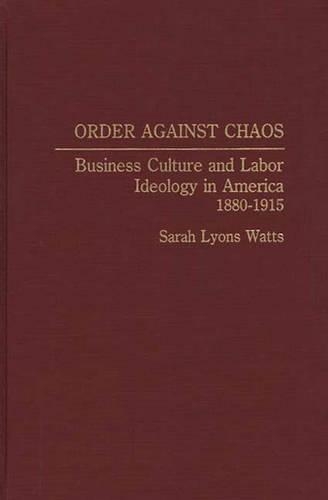
Order Against Chaos: Business Culture and Labor Ideology in America, 1880-1915
(Hardback)
Publishing Details
Order Against Chaos: Business Culture and Labor Ideology in America, 1880-1915
By (Author) Sarah Watts
Bloomsbury Publishing PLC
Praeger Publishers Inc
14th February 1991
United States
Classifications
Tertiary Education
Non Fiction
305.5620973
Physical Properties
Hardback
208
Description
Historians now mark the years between 1880 and 1915 as the beginning of mass culture in the United States and its consolidation under the ideals and values of private corporations. In this study, Sarah Lyons Watts contends that modern American attitudes toward the relationship between labor and capital, as well toward the place industrial labor was to occupy in the corporate state, coalesced in the debates in popular, business, and professional literature in the decades around the turn of the century. She illustrates how the magnitude and significance of changes in the transmission of cultural authority made these years critical in the evolution of industrialists' labor ideas. Following a detailed introduction that provides an overview of the period and a discussion of cultural hegemony, Watts focuses on three case studies: the Pullman strike, an ideological struggle in which public opinion figured not just in the outcome of the strike, but in the definition of labor's place in the corporate order; modern management, which sought to replace workers' traditional definitions with its own and transform the ethos of modern factory work; and the National Association of Manufacturers' anti-union campaign. These case studies demonstrate how nationwide organizations of businessmen met the charges against concentrated capital made by unionists and reformers, advancing arguments that linked the moral value of capital to civic services, national honor, and progress. A concluding chapter, recounting the dramatic social reorganization that was the ultimate product of this period, and a selected bibliography, complete the work. This book will be a useful reference for courses in American, business, social, and labor history, as well as an important resource for public and academic libraries.
Reviews
Professor Watts demonstrates skillfully how the forces of the state, science and technology, the educational system, and mass communication were utilized by capital to develop and propagate ideas as tools of social instruction. . . . The book is a useful contribution to the growing literature on the triumph of the capitalist corporate ideal, its influence on mass culture, and its subordination of industrial labor.-Labor Studies Journal
Watts argues that modern American attitudes toward the relationship between labor and management were profoundly influenced by employers during the period 1880 to 1915. In this well-written, thoroughly documented book, she asserts that corporate capitalism consciously and deliberately embarked on a campaign to make its ideology concerning labor the dominant one in American society. Employing the most modern means of mass communication available, as well as sophisticated rhetoric and propaganda, American management succeeded, to a significant degree, in shaping public opinion concerning the proper role of labor. Lyons examines this phenomenon using the theoretical framework of ideological hegemony or social control. Her major thesis is illustrated through substantial, and useful, case studies of the Pullman Strike of 1894; the development of modern management techniques, largely shaped by the scientific management theories of Frederick Taylor; and the propaganda program of the National Association of Manufacturers, including its open shop campaign. This book should find an audience among faculty, graduate students, and advanced undergraduates. Recommended for all academic collections.-Choice
"Professor Watts demonstrates skillfully how the forces of the state, science and technology, the educational system, and mass communication were utilized by capital to develop and propagate ideas as tools of social instruction. . . . The book is a useful contribution to the growing literature on the triumph of the capitalist corporate ideal, its influence on mass culture, and its subordination of industrial labor."-Labor Studies Journal
"Watts argues that modern American attitudes toward the relationship between labor and management were profoundly influenced by employers during the period 1880 to 1915. In this well-written, thoroughly documented book, she asserts that corporate capitalism consciously and deliberately embarked on a campaign to make its ideology concerning labor the dominant one in American society. Employing the most modern means of mass communication available, as well as sophisticated rhetoric and propaganda, American management succeeded, to a significant degree, in shaping public opinion concerning the proper role of labor. Lyons examines this phenomenon using the theoretical framework of ideological hegemony or social control. Her major thesis is illustrated through substantial, and useful, case studies of the Pullman Strike of 1894; the development of modern management techniques, largely shaped by the scientific management theories of Frederick Taylor; and the propaganda program of the National Association of Manufacturers, including its open shop campaign. This book should find an audience among faculty, graduate students, and advanced undergraduates. Recommended for all academic collections."-Choice
Author Bio
SARAH LYONS WATTS is Assistant Professor of History at Wake Forest University.
